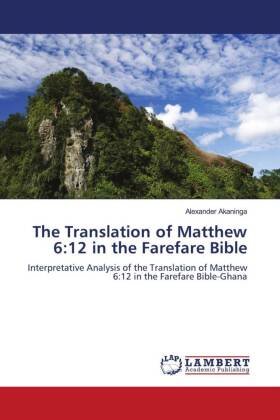The main issue of the study is the translation of the Greek word " phi " (forgive) as "patience" in the Farefare language of the Upper East Region of the Republic of Ghana. By examining the Farefare translation of the text, focusing on the use of the term "to have patience" instead of "to forgive," the research confirms that the Farefare translation consistently substitutes the verb "forgive" with the noun "patience," particularly in the context of human-to-human forgiveness. The researcher examined the usage of the word in the Bible, particularly in Matthew 6:12, and its translation in the Farefare Bible. The study maintains that the Farefare term suguru which is often used to translate " phi ," is inappropriate because suguru is a noun, while " phi " is a verb. It is also established that the word bah in Farefare, has the meaning of "forgive," and frequently accompanies the noun be'em (sin/wrongdoing). The cultural understanding of the Frafra people is that patience is necessary before granting forgiveness.

